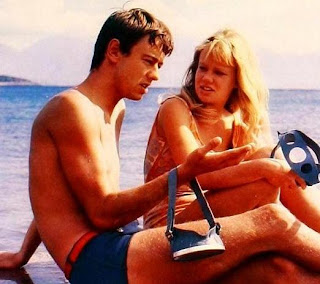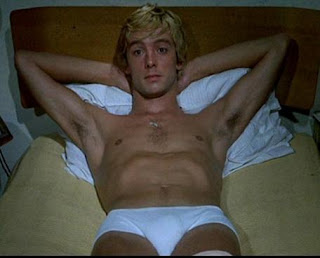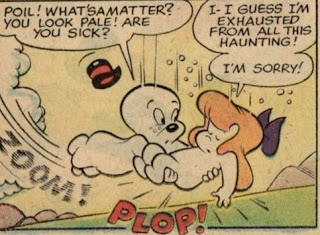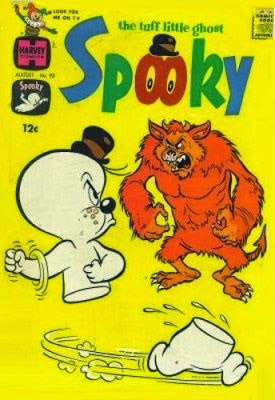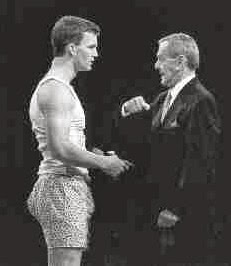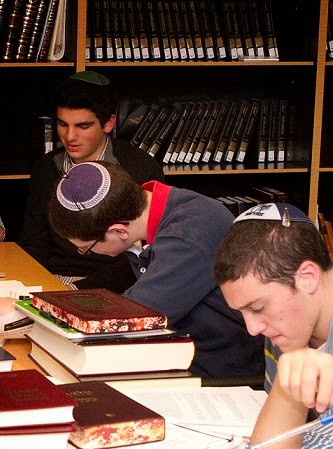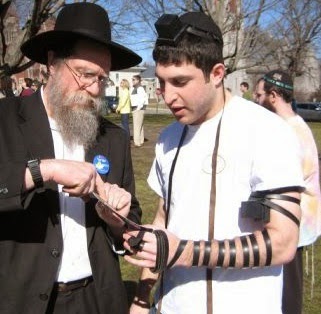March 9, 1995, a Thursday night. I always watch Seinfeld at 9:00, and then at 9:30 occasionally the Seinfeld knockoff Friends, about a group of younger, less cynical friends negotiating small-town Manhattan. Mostly because the first ads promoting the show displayed them in their underwear; they haven't been shown in their underwear since, but one can hope.
Tonight's episode is called: "The One Where the Monkey Got Away."
The pet capuchin monkey of nerdish paleontologist Ross (David Schwimmer) escapes while his crush Rachel (Jennifer Anniston) is babysitting. The friends all search, but run into a recalcitrant neighbor and the revenge plans of an animal control officer (Megan Cavanaugh) whom Rachel bullied in high school.
At the end of the episode, they all share stories of the horrors of high school life, except for horndog Joey (Matt LeBlanc): for him, high school was "just four years of parties and dating and sex."
Chandler (Matthew Perry) morosely states that he went to a private boys' school: "Any sex I had would have involved a major lifestyle choice."
A major lifestyle choice? Is he kidding?
A MAJOR LIFESTYLE CHOICE?????
This is not the era of the Reagan-Bush conservative retrenchment. We're in the heart of the relatively gay-positive Clinton years. Roseanne had been kissed by a lesbian admirer; there was a gay wedding on Northern Exposure. There are gay partnership laws, anti-discrimination ordinances. The horrendous "Don't ask, don't tell" policy is being challenged in the Supreme Court.
It's not exactly safe in the straight world beyond gay neighborhoods, but it's safer than it has been in over a decade.
Then Chandler said that?
I knew that Friends was heterosexist, extolling male-female romance as the meaning of life. I knew that the guys ridicule each other's slightest gender misstep as evidence that they are gay. But this isn't minor, veiled, "panic-over-touching-a-dude" homophobia. It's open, brutal, disgusting.
Who is responsible for this outrageous slap in the face of every gay person on Earth?
The episode was written by Jeff Astrof and Mike Sikowitz.
Jeff Astrof (left) wrote eight other episodes of Friends. More recently he has written and been executive producer of Grounded for Life, The New Adventures of Old Christine, and S*** My Dad Says (yes, there really was such a program), and Partners (about two best buds, one straight, one gay).
Mike Sikowitz (below) co-wrote the episodes, collaborated with Jeff Astrof on most of his projects, and also wrote/produced episodes of The Class (which had a gay character and a gay-stereotyped straight character who shrieks "Oh, my popovers!"), Rules of Engagement, The McCarthys (which has a gay character), and Welcome to the Family.
He has a film writing credit in 2014: Larry Gaye: Renegade Male Flight Attendant. I'm not kidding.
Neither of them seem the faces of evil, exactly. They're just really, really ignorant, believing that gay men were born straight, but at some point made the decision to turn into flitting, wispy creatures who shriek "Oh, my popovers!" Lesbians, conversely, made the decision to turn into butch, short-haired creatures who grunt a lot.
Another question: why didn't someone speak up? Director Peter Bonerz? Creator David Crane, or guest star Megan Cavanaugh, who are both gay?
Why didn't anyone insist that the line be changed to something less ridiculously homophobic?
30.4 million people watched. The next week's episode had only 29.4 million, perhaps the result of 1,000,000 gay people and allies turning off Friends forever.
I didn't watch Friends again, except for the nine episodes with Giovanni Ribisi as a guest star. He was cute, so I figured I could handle the hatred.
See also: The Homophobic Small Town Manhattan of "Friends."
Tonight's episode is called: "The One Where the Monkey Got Away."
The pet capuchin monkey of nerdish paleontologist Ross (David Schwimmer) escapes while his crush Rachel (Jennifer Anniston) is babysitting. The friends all search, but run into a recalcitrant neighbor and the revenge plans of an animal control officer (Megan Cavanaugh) whom Rachel bullied in high school.
At the end of the episode, they all share stories of the horrors of high school life, except for horndog Joey (Matt LeBlanc): for him, high school was "just four years of parties and dating and sex."
Chandler (Matthew Perry) morosely states that he went to a private boys' school: "Any sex I had would have involved a major lifestyle choice."
A major lifestyle choice? Is he kidding?
A MAJOR LIFESTYLE CHOICE?????
This is not the era of the Reagan-Bush conservative retrenchment. We're in the heart of the relatively gay-positive Clinton years. Roseanne had been kissed by a lesbian admirer; there was a gay wedding on Northern Exposure. There are gay partnership laws, anti-discrimination ordinances. The horrendous "Don't ask, don't tell" policy is being challenged in the Supreme Court.
It's not exactly safe in the straight world beyond gay neighborhoods, but it's safer than it has been in over a decade.
Then Chandler said that?
I knew that Friends was heterosexist, extolling male-female romance as the meaning of life. I knew that the guys ridicule each other's slightest gender misstep as evidence that they are gay. But this isn't minor, veiled, "panic-over-touching-a-dude" homophobia. It's open, brutal, disgusting.
Who is responsible for this outrageous slap in the face of every gay person on Earth?
The episode was written by Jeff Astrof and Mike Sikowitz.
Jeff Astrof (left) wrote eight other episodes of Friends. More recently he has written and been executive producer of Grounded for Life, The New Adventures of Old Christine, and S*** My Dad Says (yes, there really was such a program), and Partners (about two best buds, one straight, one gay).
Mike Sikowitz (below) co-wrote the episodes, collaborated with Jeff Astrof on most of his projects, and also wrote/produced episodes of The Class (which had a gay character and a gay-stereotyped straight character who shrieks "Oh, my popovers!"), Rules of Engagement, The McCarthys (which has a gay character), and Welcome to the Family.
He has a film writing credit in 2014: Larry Gaye: Renegade Male Flight Attendant. I'm not kidding.
Neither of them seem the faces of evil, exactly. They're just really, really ignorant, believing that gay men were born straight, but at some point made the decision to turn into flitting, wispy creatures who shriek "Oh, my popovers!" Lesbians, conversely, made the decision to turn into butch, short-haired creatures who grunt a lot.
Another question: why didn't someone speak up? Director Peter Bonerz? Creator David Crane, or guest star Megan Cavanaugh, who are both gay?
Why didn't anyone insist that the line be changed to something less ridiculously homophobic?
30.4 million people watched. The next week's episode had only 29.4 million, perhaps the result of 1,000,000 gay people and allies turning off Friends forever.
I didn't watch Friends again, except for the nine episodes with Giovanni Ribisi as a guest star. He was cute, so I figured I could handle the hatred.
See also: The Homophobic Small Town Manhattan of "Friends."



















